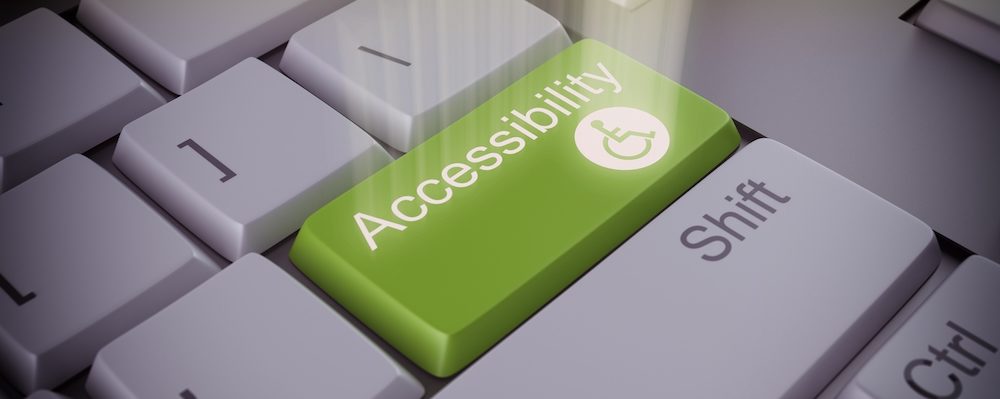
One of the most common requests we get is for training about language and disability. In this issue of the Explore Access Update, we provide some information and resources on this topic.
Language and Disability
Many people want hard and fast rules about what disability-related language to use. Others often dismiss the topic of language and word choice as being about “political correctness.” Research, though, is making it more clear that our language shapes our thought. The words we choose also have an impact on those around us.
The American Heritage Book of English Usage, published in 1996 states:
“One of the most basic ways of showing respect for others is to refer to them by the names with which they have chosen to identify themselves and to avoid using names that they consider offensive.”
Thinking About Language
Rather than setting rules about what is okay and is not okay to say, we suggest putting more thought into what messages certain phrases send and what images they create in our minds. It is important to recognize that language is constantly evolving and that not everyone within the disability community agrees on or prefers the same use of language.
It is ideal to avoid language that:
- paints a negative picture of disability
- patronizes people with disabilities
- perpetuates misconceptions
Instead, choose language that is consistent with the idea that lack of access and societal attitudes are the problem—not disability.
We’ll look at a couple of common phrases and think about how they measure up to these criteria. Let’s start with the phrase wheelchair bound. Does this phrase paint a negative image of disability? Does this phrase perpetuate misconceptions? Wheelchair users we know would say that wheelchairs are tools that increase mobility, not something that is limiting. So this phrase is generally seen as negative and inaccurate.
What about the phrase differently abled? This phrase would be considered a euphemism for the word disability. Many people use euphemisms because they think they are more positive. But let’s look at the definition of euphemism. The definition of euphemism from the Oxford dictionary is:
“A mild or indirect word or expression substituted for one considered to be too harsh or blunt when referring to something unpleasant or embarrassing.”
So what message does using a euphemism for disability send? It commmunicates that disability is a word to be avoided and paints a negative picture of disability. Some people also find this language patronizing.
People First or Identify First Language
There are some people who are strong advocates of what is called people first language. This approach would suggest the use of the phrases person with a disability or people with disabilities. Those who promote this language see it as more respectful because it emphasizes the person rather than the disability. Others are proponents of identity first language, thus using the phrase disabled people. Their perspective is that disability is a natural part of human diversity and there is no reason to shy away from that identity. They would argue that we don’t see a problem with saying African American woman or gay man so the phrase disabled people should be equally acceptable.
Supporters of both identity first and people first language would generally agree that in most cases it makes sense to use “people first” when talking about specific conditions. So, for example, one would say a person with cerebral palsy or a person with a speech disability. There are some exceptions to this as well, though, as identity first language is preferred by many people who are Deaf, Blind, DeafBlind, and Autistic.
Phrases to Avoid
Though we encourage a thoughtful approach to language use rather than simply memorizing a list of right and wrong words or phrases, there are certain phrases that are widely agreed upon as problematic. The National Center on Disability and Journalism has a good listing. We list some of those here.
- abnormal
- afflicted with, suffers from, or a victim of
- able-bodied (preferable is nondisabled)
- confined to a wheelchair
- deaf and dumb
- deaf-mute
- mentally retarded or retarded
- has the mind of an x-year old
Summary
The best way to learn to use respectful language is to engage with disability activists and listen to those perspectives. Nick Marcellino, the brother of Rosa Marcellino for whom Rosa’s Law was named, is quoted as saying “What you call someone is how you treat them.” Taking time to learn and think about the language we use is one way to show respect.
Resource Highlight
The content above is adapted from the Language and Disability module that is a part of the Disability as Diversity Programming Toolkit.
Our thanks to the Southwest ADA Center for funding this project.
Suggested Resources
- Autistic Self Advocacy Network: Identity-First Language: A blog post originally posted on the blog of Lydia X. Z. Brown that explores various perspectives on language and autism.
- ‘Disabled’: Just #SayTheWord: This NPR article summarizes an interview with Lawrence Carter Long by Barbara J. King discussing the reason behind the hashtag #SayTheWord.
- National Center on Disability and Journalism – Disability Language Style Guide: The style guide is intended for journalists, communication professionals and members of the general public who are seeking the appropriate and accurate language to use when writing or talking about people living with disabilities.
- Guidelines for Writing about People with Disabilities: This factsheet from the ADA National Network provides guidelines for portraying individuals with disabilities in a respectful and balanced way by using language that is accurate, neutral and objective.
- Producing Positive Disability Stories: This guide by Haben Girma provides guidance for media and journalists but is helpful to others as well.
- Syracuse University Disability Cultural Center Language Guide: The purpose of this language guide is to provide you with some information on the different types of language that are used frequently when communicating about disability.
Upcoming Events
Free Webinar
Sponsored by Great Lakes ADA Center
Accessible Polling Places
Thursday, October 4, 2018
1:30 PM Central Time Zone
Register for the Accessible Voting webinar!
Free Webinar
Sponsored by Great Lakes ADA Center
The Right to Vote: Access for People with Disabilities
Thursday, October 16, 2018
1:00 PM Central Time Zone
Register for the Right to Vote webinar!
Free Webinar
Sponsored by Great Lakes ADA Center
Creating Accessible Documents with Adobe InDesign
Thursday, November 15, 2018
1:00 PM Central Time Zone
Register for the Adobe InDesign workshop here!
Stay Connected with Us!
Enjoy getting resources on access an inclusion? Follow Partners for Inclusive Communities on Facebook and Twitter for more great news and resources!
About Explore Access
exploreaccess.org is a web resource developed through a project of the Southwest ADA Center Regional Affiliate – Arkansas, a program of UA Partners for Inclusive Communities through funding from the Southwest ADA Center (90DP0092).
